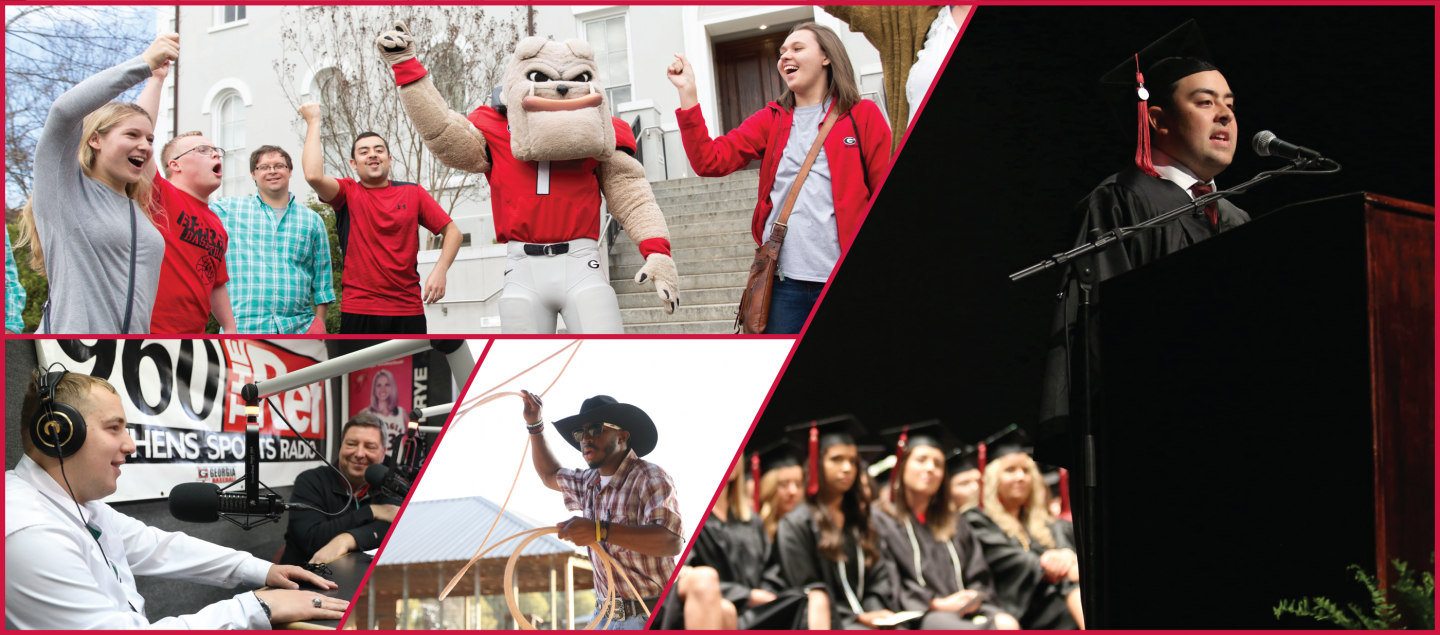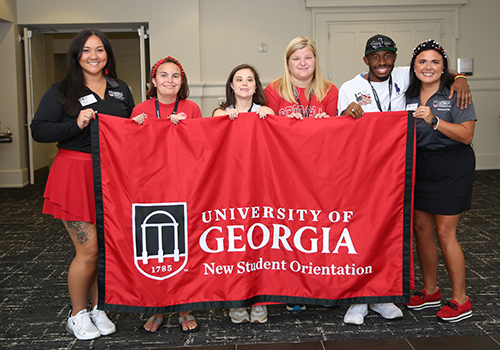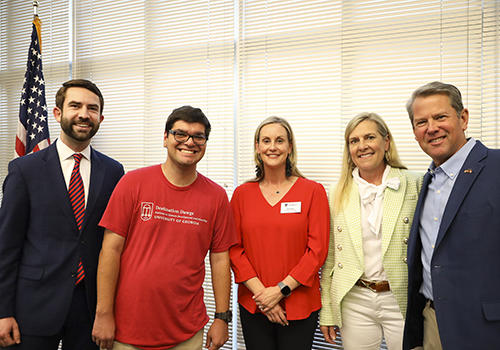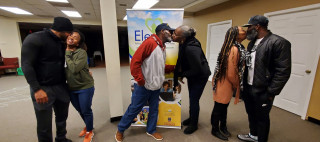Destination: Arrived and thriving

There are more than 2,000 seats in the Classic Center Theatre.
On this day, every seat is taken, with more than 400 black-robed graduates on the stage and four times that many smiling family members in the theater and balcony.

Justin Mejias sits on the front row under the bright lights. He takes a deep breath and approaches the podium.
He introduces himself, then shares a personal story:
“I wanted to come to UGA because I wanted to challenge myself and improve my career goals. I saw it as an opportunity to step out of my comfort zone and to be more confident in myself.”
He talks about the things he accomplished during his time at UGA: earning his driver’s license, leading music therapy sessions, mentoring other students.
“I've learned that anyone can achieve their dreams if they are willing to work hard and find the help and support they need to overcome the obstacles in their path.”
Among the hundreds of parents and family members in the audience that day in 2019 is Martha Mejias, Justin’s mom, the only person there more nervous than him.
Obstacles. Martha knows them intimately.
She remembers the autism diagnosis when Justin was 3 and how the doctor was so cruel in delivering the news.
“He said Justin may never talk, may never go to school, may become violent and placed in an institution,” she said. “It was horrible.”
She remembers the bullying throughout school that was so bad Justin often wanted to drop out, and how he refused to attend his high school graduation.
She remembers researching autism and setting goals for herself when Justin was a child: tell him 100 times a day she loves him; hug him 50 times a day; sing the alphabet song to him 25 times a day.
“I learned that repetition was key for him,” she said. “You’d think he’s never going to get this, then all of a sudden, he does.”
She remembers joining up with two other moms of kids with autism to create the first inclusion class in Jackson County, and the support groups and summer camps and clubs that made the world less lonely, more encouraging.
It was at one of those outings in 2016 that somebody told her about Destination Dawgs, a new two-year certificate program at UGA for students with intellectual disabilities set to launch the following year.
Destination Dawgs students would focus on career readiness, take UGA classes, be assigned peer mentors and participate in social activities with an emphasis on building independence.
Justin was chosen for the first cohort in spring 2017.
“I told Justin it was God again, making a way for you,” Martha said.
In his final days in the program, Justin was chosen to be a speaker at the College of Family and Consumer Sciences’ graduation. He labors over his speech, rehearses it at home and with friends. He feels ready for the moment.
He closes with a loud “Go Dawgs!” The crowd erupts.
Laying the foundation
The idea for what would become Destination Dawgs originated in 2014 when the UGA J.W. Fanning Institute for Leadership Development received funding from the Georgia Council on Developmental Disabilities to conduct a feasibility study for an inclusive postsecondary education (IPSE) program at UGA.
At the time, Kennesaw State University housed the only IPSE program in the state.
Lori Tiller, now a public service faculty member with Fanning, connected with Carol Britton Laws in the FACS Center on Human Development and Disability, who agreed to house the program.

After securing additional federal funding from the Model Comprehensive Transition and Postsecondary Programs for Students with Disabilities (TPSID) grant in 2015, the fully-inclusive program design began to take shape.
Meanwhile, the UGA Student Government Association executive leadership, particularly vice-president Jim Thompson, began rallying support among the student body for the creation of a program like Destination Dawgs.
Thompson became an early advocate after seeing a viral video of a student with Down syndrome being accepted into the ClemsonLIFE postsecondary program.
“It didn’t take that much work to convince a sizable group of students that this program was worth bringing to campus,” said Thompson, who graduated in 2015 and now practices law in Atlanta. “Once we had conversations with people and explained there’s value in welcoming students with different lived experiences, that it would enrich the learning environment at UGA, people got it.”
With all the pieces in place, including the hiring of program director Lisa Ulmer in 2016 and the subsequent training of dozens of student peer mentors, the program launched with an inaugural cohort of five students in January 2017.
That fall, thanks largely to the advocacy of SGA leaders Houston Gaines and Darby Miller, who succeeded Thompson, the students were recognized in Sanford Stadium prior to the Auburn game.
Immediately afterward, Ulmer was flooded with messages from faculty across campus eager to support Destination Dawgs.
“That was really a pivotal moment for the program,” she said.
Creating opportunities
Jeremiah Thomas is in his element. He’s standing outside the UGA Livestock Arena, lasso overhead, a metal roping dummy about 30 feet away.
A few twirls of the lasso and a flick of the wrist, and Thomas ropes the faux steer five consecutive times, impressing a handful of UGA Block and Bridle club team members watching at a distance.
Thomas is three months into his Destination Dawgs experience. He grew up in tiny Nashville, Ga., and developed a passion for roping and riding while watching Westerns at his grandmother’s house.
As a boy, he fashioned reins out of string and draped them around the handlebars of his bicycle to create a makeshift horse, entertaining himself for hours.

Not long after, his mother discovered KB Horse Camp, a Christian-based horse farm in Hahira, and Thomas became a devotee.
He quickly learned the basics and went on to win five belt buckles for his prowess in riding and “bulldogging,” or steer wrangling.
“I felt like that could be the kind of thing I want to do,” he said. “It was amazing to me.”
One of the key tenets of Destination Dawgs is matching students with courses and activities that align with their interests.
His first semester, Thomas is taking a companion animal class taught by Kari Turner in the department of animal and dairy science, where he recently gave a presentation about his life in the rodeo.
Dexter Goedelman, a member of the 2022 cohort from St. Augustine, Fla., loves classical music, vinyl records and outdated technology.
At UGA, he has taken intro to journalism and music business classes and recently spent an entire day at Cox Media Group visiting several radio stations, even chatting on-air with the sports guys at 960 The Ref.
These types of experiences help fill what Ulmer called a “gap of opportunities” available for students with intellectual disabilities once they age out of high school.
“How do you take a student with an intellectual disability and put them in a university class in a meaningful way, in a way that others see value in their participation and belonging and not pitying them? That’s the dialogue we’re trying to change,” she said.
Obstacles remain, primarily a lack of on-campus housing and program costs that make it unattainable for some families.
The program supports just three full-time staff members: Ulmer, transition coordinator Alexis Szelwach and mentor coordinator Kristina Britton, meaning capacity is limited and cohorts capped at five students. Currently, there are no paid supports for Destination Dawgs students.
Validation has taken several forms since the program’s inception, however.
Destination Dawgs students have taken a total of 130 UGA classes, supported by 726 peer mentors, and have interned at 19 local sites ranging from the Athens Humane Society to UGA Athletics.
In March, the Georgia Legislature passed a bill that covers tuition for students in IPSE programs, similar to the HOPE Scholarship program.

program director Lisa Ulmer with Rep. Houston Gaines,
First Lady Marty Kemp and Gov. Brian Kemp
at a signing ceremony for a bill that created state-funded
scholarships for IPSE students.
Gaines, the former SGA president and Destination Dawgs advocate who was elected as a state representative in 2018, authored the bill.
Less quantifiable successes come in the form of volunteers who change their major after discovering a hidden calling to work with students with disabilities, and the friendships Destination Dawgs make with student volunteers that last long after graduation.
“These are beautiful stories we should celebrate more,” Ulmer said.
Overcoming
Mejias is 31 now. He received his driver’s license in the last month of the Destination Dawgs program, the culmination of a problem-solution project undertaken in a “Learning for success” class.
He called Ulmer to share the news.
“That has changed his life in a way that maybe others wouldn’t see as much value in,” Ulmer said, “but now he doesn’t have to be dependent on his mother for transportation. Things like that, to me, are really significant outcomes for the program.”

Mejias worked as an inclusion aide for the Athens-Clarke County Leisure Services after finishing the program. He’s now enrolled in an online medical coding class.
“He believes in himself more now,” Martha said. “He’s just much more confident, more optimistic about his future.”
He also has rediscovered one of his first loves.
Mejias’s grandmother introduced him to music at an early age. After she died, he quit playing altogether.
“He said it made him sad thinking about her,” Martha said.
A few years ago, he began playing again. He taught himself guitar, created a YouTube page and uploaded his first video, a cover of Ed Sheeran’s “Photograph.”
Earlier this year, he wrote his own song and uploaded it to his channel.
It’s called “Overcoming.”
Growing up, I felt alone, not knowing who to turn to
It’s hard to rely on someone not knowing what they would do
I had a wall that was hard to break down
But through it all you can overcome
When I was down, about to give up
I came back much stronger now
Don’t look down the road, just push ahead
Don’t matter what life throws at you
Never give up,’cause you are strong
’Cause I know I can make it through
In this category: Family
-
Multidisciplinary FACS team receives $6.1 million grant to aid Georgia families
Elevate Couples Georgia team seeks to deliver Healthy Marriage and Relationship Education program to 1,300 couples

-
Kogan recognized for advancing family-centered prevention science
Professor honored by Society of Prevention Research for decades of work related to families

-
Geier named college’s first associate dean for research
HDFS professor will enhance college's research infrastructure

-
Hargrove named assistant director of UGA Love and Money Center
Licensed marriage and family therapist will teach graduate-level courses and lead outreach efforts

-
Lack of sleep disrupts key brain functions in adolescents
More sleep could protect children’s mental health

